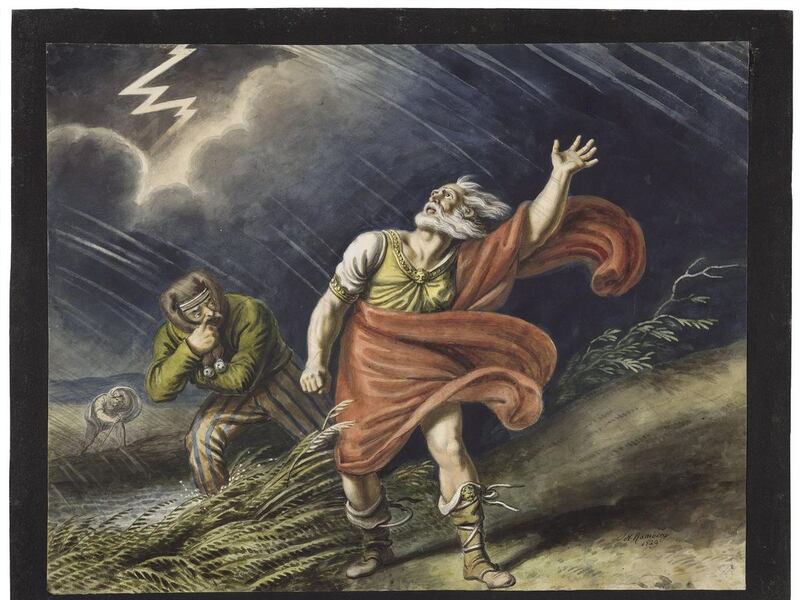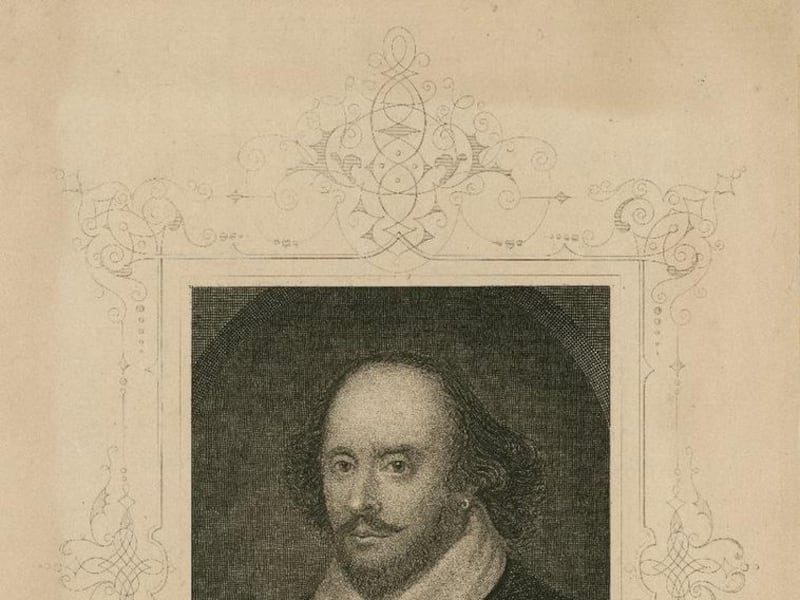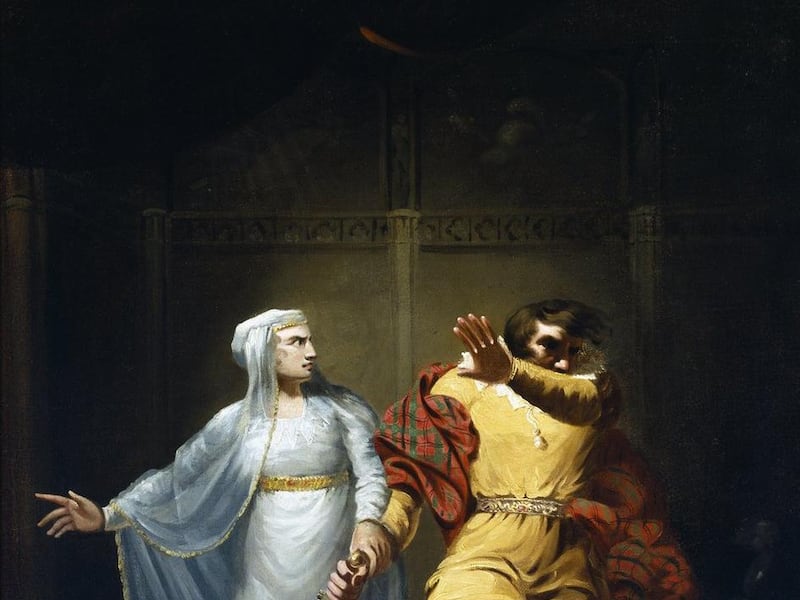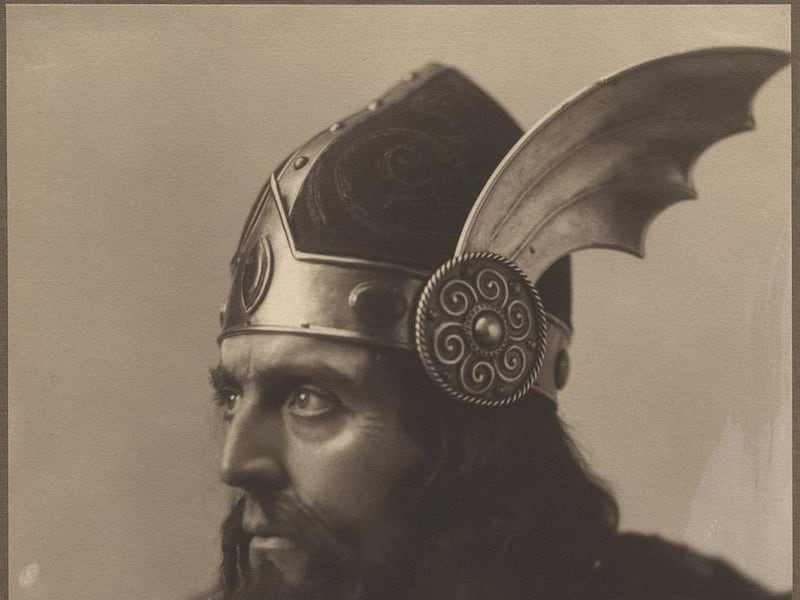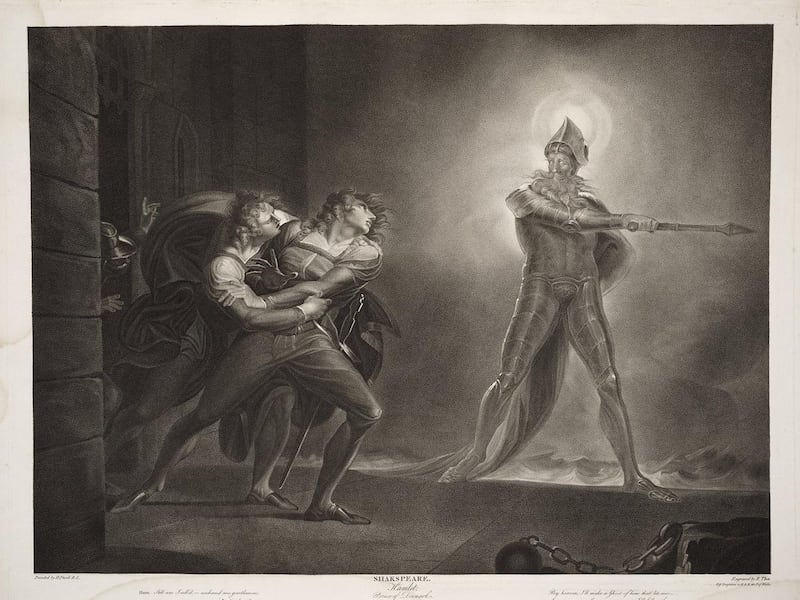Peggy O’Brien describes her inaugural exposure to William Shakespeare like a first crush: Her voice trails off a little, lost in the time and distance between this moment and the afternoon (“a long time ago,” she qualifies) when she was 14 and a guy wearing a costume donkey head invited her to a play.
“It was like magic,” she says in a faraway voice. “It was in the auditorium where I’d been dozens of times for assemblies and things transformed into another world.”
The guy was an actor encouraging O'Brien and her classmates to return to school that evening for a local production of “A Midsummer Night’s Dream” (hence the donkey head). For O’Brien, who is now the director of education at the Folger Shakespeare Library in Washington, D.C., the evening was life changing.
O’Brien’s story is a microcosm of a question inherent in the 400th anniversary of Shakespeare’s death this month: What would the world look like without William Shakespeare?
“You could lead a perfectly fine life and not have an acquaintance with Shakespeare,” she said. “But you’d miss a lot.”
For people whose time with the Bard begins and ends with a few weeks in high school English class, it’s hard to put a finger on why, centuries later, Shakespeare is still the most important writer of the English language — creating, aside from memorable characters, some of the most common phrases of the modern lexicon.
As British journalist (and Shakespeare aficionado) Bernard Levin once put it, “If you have played fast and loose, if you have been tongue-tied, a tower of strength, hoodwinked or in a pickle, if you have knitted your brows, made a virtue of necessity, insisted on fair play, slept not one wink, stood on ceremony … laughed yourself into stitches, had short shrift, cold comfort or too much of a good thing, if you have seen better days or lived in a fool's paradise … you are quoting Shakespeare.”
But language is just one way that Shakespeare’s work has infused itself into Western culture. Like the Bible, Shakespeare’s works are full of moral dilemmas and religious references that still ring true today.
“If you watch his plays, you walk out of the theater with a deepened sense of what’s right and wrong,” Northwestern University English professor Regina Schwartz said. “Partially it’s because his characters are so compelling — they’re like us, they’re greater than us and they’re less than us. They’re invitations to us and they’re cautions to us.”
Experts say that’s because Shakespeare’s greatest inspiration was likely the Bible.
“Shakespeare’s go-to place is the Bible. He inherited ideas of justice that are biblical and then dramatized them,” Schwartz said. “Even in his bleakest tragedies, his vision is really indebted to Leviticus, where it says love the neighbor, love the stranger, for you were once a stranger in the land of Egypt.”
That sentiment goes double for Shakespeare’s more difficult characters, Schwartz said — the ambition-spoiled Lord and Lady Macbeth or the revenge-consumed Hamlet who, despite committing the worst sins, compel us all “to be or not to be.”
“Shakespeare continues to inform our ethical vision largely by creating characters who offend our ethical vision of what goodness is,” Schwartz said.
To read Shakespeare’s plays is to find ourselves reflected in people and places so seemingly unfamiliar, so foreign and removed from modern life that their power is magnified — which is why, University of Delaware English professor Kristen Poole says, readers will still be talking about them in another 400 years.
“His work is about compassion — love God, love your neighbor. Well … what does that look like? And what does compassion look like for people you don’t like?” Poole said. “We would all be better people if we read more Shakespeare.”
Here are some examples of how Shakespeare’s work is still relevant to modern morality:
King Lear
“A plague upon you, murderers, traitors all!
I might have saved her. Now she’s gone for ever.
Cordelia, Cordelia, stay a little.”
— King Lear, Act 5, Scene 3
Some of Shakespeare’s most important ethical lessons about moral choice and the importance of family come from one of his most harrowing tragedies, King Lear. As with Hamlet and some other plays, Lear raised the tension and tragedy while grabbing the audience through the story of a king who abuses, banishes and eventually reconciles with his daughter, only to lose everything.
“It’s family drama in Lear that gives rise to national crisis, and there’s this sense that when these people make decisions, everything is at stake,” Schwartz said. “At the same time these biblical values like forgiveness, devotion and care are encoded into the play even as they’re being offended.”
Despite its gut-wrenching ending, said Southern Oregon University Shakespeare Studies professor David McCandless, the play offers high moral lessons for its audience.
“Happy endings don’t always happen. It would have been wonderful if Cordelia (Lear’s daughter) had lived, but it’s not about reconciliation, it’s about what it means to be human and that’s never better rendered than when you see this broken, old man leaning over the corpse of his daughter, willing her back to life,” McCandless said.
Even in the depths of tragedy, McCandless said Lear is not without a strong spiritual hope.
“Lear’s process of regeneration is spiritual. It’s penance, it’s repentance for his narcissism,” McCandless said. “It’s aligning with the ideals of love and forgiveness that are so integral to Christianity.”
“What does a parent owe his or her child? What does a child owe his or her parent?” O’Brien said. “We’re still asking those questions now.”
Othello
“I hate the Moor.”
— Othello, Act 1, Scene 3
In many ways, Othello has never been more relevant than it is right now, at a time when fatal confrontations with law enforcement flared simmering racial tensions across the country and economic conditions along with terrorist attacks have spawned fear against immigrants and Muslims, in particular. Blind racism is powerfully portrayed in the vengeful Iago when he expresses his hatred of Othello's African and Muslim heritage.
“In Othello, it’s about a lot of the issues that are still so troubling in this country and this suspicious of people who we decide are ‘the other,’” O’Brien said. “He’s betrayed by Iago, a man whom he trusts.”
Othello also has modern lessons in a time when reputation has become so fragile in an online world.
"Othello explores how love can be destroyed by mere suggestion,” Schwartz said. “It’s stressing how vital and fragile love is.”
“Talk to me about a reputation — high school is all about people talking to each other and when you ask kids about this, they know it takes a long time to get a good reputation and you can lose it in a minute,” O’Brien said. “(As in Othello) and on the Internet, someone can lose it for you.”
Romeo and Juliet
“See what a scourge is laid upon your hate
That heaven finds means to kill your joys with love!
And I, for winking at your discords, too
Have lost a brace of kinsmen. All are punished.”
— Romeo and Juliet, Act 5, Scene 3
Arguably the most famous of Shakespeare’s plays, experts say this tragedy is the best example of how Shakespeare’s work changes with its audience — taking on new meanings for different people at different stages of life.
“When you teach Romeo and Juliet to ninth graders, they’re not thinking about the parents and their perspective — there’s something different for them,” O’Brien said. “But later in life, they will. During the masked ball when they first see each other, Old Capulet says to someone, ‘I’m past my dancing days.’ I get that now.”
And at a time when so much of the world is fighting wars that now span generations, Schwartz says the story is a potent reminder of the power of peace and the meaningfulness of our actions.
“Shakespeare doesn’t just have this cold idea of justice, that we can calculate what fairness is, but also the idea of care and love as part of creating a just world order,” Schwartz said. “It gives generations hope, a war-torn world, hope. These children are born into these enmities that they didn’t construct and they don’t understand. This play takes that on and says they don’t have to continue like this.”
Hamlet
“Oh, my offence is rank. It smells to heaven.
It hath the primal eldest curse upon ’t,
A brother’s murder. Pray can I not.”
— Hamlet, Act 3, Scene 3
Shakespeare’s play contain countless biblical references, but Schwarz says Hamlet is a terrific example of how Shakespeare used the story of Cain and Abel to enrich and inform his story of Denmark’s revenge-hungry prince.
“You’re not just engaged in Hamlet’s story, you have that whole other story layering the meaning … that his audience knew,” Schwartz said. “You could argue that Shakespeare is bringing the Bible to his plays, but he’s also transporting you into the Bible stories. What does it mean to read Hamlet through the lens of Cain and Abel? The stories end up informing each other.”
Like Cain and Abel, McCandless says Hamlet is a morality tale that presents moral dilemma and the perils of failing the righteous path.
“The course in Hamlet is that he should take revenge. But should he? Why should we think murder is all right? It’s compelling because even in a comparatively petty way, we’ve all wanted revenge,” McCandless said. “That can be carried to cataclysmic dimensions when you take it to a global scale. Hamlet is taking revenge against the world.”
Macbeth
“Look like th' innocent flower,
But be the serpent under ’t.”
— Macbeth, Act 1, Scene 5
Macbeth challenges society’s vision of morality because of its lack of redemption for its two leads, Lord and Lady Macbeth, who murder their king purely to assume the throne. Ruthless Lady Macbeth embodies the tempting Eve, from the Bible's creation story, when Lady Macbeth convinces her wavering husband to go through with the murder of the king he’s spent his life defending on the battlefield.
To Poole, Macbeth is Shakespeare’s most nuanced exploration of morality because its protagonists are irredeemable. In a twisted way, it makes the Macbeths the most relatable of Shakespeare’s pantheon of flawed characters.
“Shakespeare wasn’t writing tidy moral stories — what’s the moral of Macbeth? Don’t murder your houseguests? Don’t marry a crazy wife?” Poole said. “No, it’s about people who have to make difficult choices and the costs of those choices.”
Sin, Macbeth proves, is seldom as simple as it seems.
“Shakespeare really understood the human race. There are lots of examples of human failure that point to values. In Macbeth, people are torn apart by their ambition,” O’Brien said. “If they had listened, Lord and Lady Macbeth might have stuck around longer.”
The Merchant of Venice
“He hath disgraced me and hindered me half a million, laughed at my losses, mocked at my gains, scorned my nation, thwarted my bargains, cooled my friends, heated mine enemies — and what’s his reason? I am a Jew.”
— The Merchant of Venice, Act 3, Scene 1
Certainly, The Merchant of Venice has lessons about religious bigotry. But when Jewish merchant Shylock demands his literal pound of flesh from Antonio, who has scorned him in part on religious grounds, Schwartz said he demonstrates how necessary humanity is in a corporate world.
“We need Shakespeare now because the kind of vision he offers counters some of the forces of individualistic capitalism that embraces one person’s well-being at the expense of another’s,” Schwartz said. “It’s the lack of generosity. When human interactions are reduced to mere contractual relations, they fail, they’re inadequate.”
Email: chjohnson@deseretnews.com
Twitter: ChandraMJohnson

